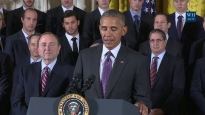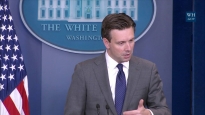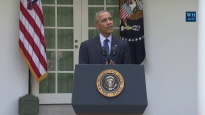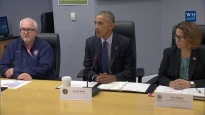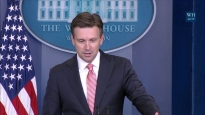President Obama Speaks on Preventing Gun Violence
February 04, 2013 | 14:25 | Public Domain
President Obama discusses the need to take action to prevent gun violence.
Remarks by the President on Preventing Gun Violence in Minneapolis, MN
Special Operations Center
Minneapolis Police Department
Minneapolis, Minnesota
1:46 P.M. CST
THE PRESIDENT: Hello, everybody. Please have a seat. Have a seat.
Well, it is good to be back in Minnesota. (Applause.) It is good to be back. Although I was commenting that they don't really have winter in Washington, D.C. (Laughter.) So I’ve gotten soft over these last four years. When I was in Chicago, this was nothing. Now it’s something. (Laughter.) But I’m grateful for all of you being here today. I want to thank Chief Harteau and the entire Minneapolis Police Department for having me here today.
There are a number of other people that I just want to acknowledge here. First of all, a wonderful man and one of America’s greatest public servants is here -- Walter Mondale, former Vice President. (Applause.) Your outstanding Governor, Mark Dayton, is here. (Applause.) Two great Mayors -- Mayor R.T. Rybak of Minneapolis, and Mayor Chris Coleman of St. Paul. (Applause.) And your outstanding congressional delegation -- Senator Amy Klobuchar -- (applause) -- Senator Al Franken -- (applause) -- Representative Keith Ellison -- (applause) -- and Representative Betty McCullough. (Applause.)
And I should acknowledge my outstanding Attorney General -- what’s your name again? (Laughter.) He does a great job every single day, and I could not be prouder of Eric Holder for his leadership on this issue in particular. (Applause.)
Now, I just had a chance to sit down with some local police officers but also community leaders, as well as folks who themselves had been victims or whose families had been victims of gun violence, to hear their ideas about how we can protect our kids and address the broader epidemic of gun violence in this country. Because if we’re serious about preventing the kinds of tragedies that happened in Newtown, or the tragedies that happen every day in places like Chicago or Philadelphia or Minneapolis, then law enforcement and other community leaders must have a seat at the table.
All the folks standing here behind me today, they’re the ones on the front line of this fight. They see the awful consequences -- the lives lost, the families shattered. They know what works, they know what doesn’t work, and they know how to get things done without regard for politics.
So we've had a very productive discussion. And one of the things that struck me was that even though those who were sitting around that table represented very different communities, from big cities to small towns, they all believe it’s time to take some basic, common-sense steps to reduce gun violence. We may not be able to prevent every massacre or random shooting. No law or set of laws can keep our children completely safe. But if there’s even one thing we can do, if there's just one life we can save, we've got an obligation to try.
That’s been the philosophy here in Minneapolis. A few years back, you suffered a spike in violent crime involving young people. So this city came together. You launched a series of youth initiatives that have reduced the number of young people injured by guns by 40 percent -- 40 percent. So when it comes to protecting our children from gun violence, you’ve shown that progress is possible. We've still got to deal with the 60 percent that remains, but that 40 percent means lives saved -- parents whose hearts aren't broken, communities that aren't terrorized and afraid.
We don’t have to agree on everything to agree it’s time to do something. (Applause.) That's my main message here today.
And each of us has a role to play. A few weeks ago, I took action on my own to strengthen background checks, to help schools get more resource officers if they want them, and to direct the Centers for Disease Control to study the causes of violence. Because for a long time, even looking at the evidence was considered somehow tough politics. And so Congress had taken the approach that, we don't want to know. Well, that's never the answer to a problem -- is not wanting to know what is going on.
So we've been able to take some steps through administrative action. But while these steps are important, real and lasting change also requires Congress to do its part and to do it soon, not to wait. The good news is that we’re starting to see a consensus emerge about the action Congress needs to take.
The vast majority of Americans -- including a majority of gun owners -- support requiring criminal background checks for anyone trying to buy a gun. (Applause.) So right now, Democrats and Republicans in the Senate are working on a bill that would ban anyone from selling a gun to somebody legally prohibited from owning one. That’s common sense. There’s no reason we can’t get that done. That is not a liberal idea or a conservative idea; it's not a Democratic or Republican idea -- that is a smart idea. We want to keep those guns out of hands of folks who shouldn’t have them.
Senators from both parties have also come together and proposed a bill that would crack down on people who buy guns only to turn them around and sell them to criminals. It’s a bill that would keep more guns off the street and out of the hands of people with the intent of doing harm. (Applause.)
And, by the way, in addition to reducing violence on the streets, it would also make life a lot easier and a lot safer for the people standing behind me here today. (Applause.)
We shouldn’t stop there. We should restore the ban on military-style assault weapons and a 10-round limit for magazines. (Applause.) And that deserves a vote in Congress -- because weapons of war have no place on our streets, or in our schools, or threatening our law enforcement officers. Our law enforcement officers should never be out-gunned on the streets. (Applause.)
But we also know that if we're going to solve the problem of gun violence, then we've got to look at root causes as well. That means we should make it easier for young people to get access to mental health treatment. (Applause.) We should help communities like this one keep more cops on the beat. (Applause.) And since Congress hasn't confirmed a director of the Bureau of Alcohol, Tobacco and Firearms in six years, they should confirm your U.S. Attorney from Minnesota, Todd Jones, who is here today and who I've nominated for this post. (Applause.)
These are common-sense measures supported by Democrats, Republicans and independents, and many of them are responsible gun owners. And we’re seeing members of Congress from both parties put aside their differences and work together to make many of them a reality.
But if there’s one thing that I’ve learned over the last four years, it’s that you can’t count on anything in Washington until it’s done. And nothing is done yet. There’s been a lot of talk, a lot of conversation, a lot of publicity, but we haven't actually taken concrete steps yet.
Last week, the Senate held its first hearing since Newtown on the need to address gun violence and the best way to move forward, and the first people to offer testimony were Gabby Giffords and her husband, Mark Kelly. They talked about how a complex problem like this has no single solution, but if we still had a 10-round limit on magazines, for example, the gunman who shot Gabby may never have been able to inflict 33 gunshot wounds in 15 seconds. Fifteen seconds, 33 rounds fired. Some of the six people who lost their lives that day in Tucson might still be with us.
Now, changing the status quo is never easy. This will be no exception. The only way we can reduce gun violence in this country is if the American people decide it’s important. If you decide it’s important. If parents and teachers, police officers and pastors, hunters and sportsmen, Americans of every background stand up and say this time it’s got to be different -- we’ve suffered too much pain to stand by and do nothing.
And by the way, it’s really important for us to engage with folks who don’t agree with us on everything, because we hope that we can find some areas where we do agree. And we have to recognize that there are going to be regional differences and geographic differences. The experience that people have of guns in an urban neighborhood may not be the same as in a rural community.
But we know, for example, from polling that universal background checks are universally supported just about, by gun owners. The majority of gun owners, overwhelming majority of gun owners think that’s a good idea. So if we’ve got lobbyists in Washington claiming to speak for gun owners saying something different, we need to go to the source and reach out to people directly. We can’t allow those filters to get in the way of common sense.
That’s why I need everybody who’s listening to keep the pressure on your member of Congress to do the right thing. Ask them if they support common-sense reforms like requiring universal background checks, or restoring the ban on military-style assault weapons and high-capacity magazines. Tell them there’s no legislation to eliminate all guns; there’s no legislation being proposed to subvert the Second Amendment. Tell them specifically what we’re talking about -- things that the majority of Americans, when they’re asked, support.
And tell them now is the time for action. That we’re not going to wait until the next Newtown or the next Aurora. We’re not going to wait until after we lose more innocent Americans on street corners all across the country. We’re not going to wait until somebody else’s father or son are murdered.
Some of the officers here today know what it’s like to look into the eyes of a parent or a grandparent, a brother or a sister who has just lost a loved one to an act of violence; to see the pain and the heartbreak from wondering why this precious life, this piece of your heart was in the wrong place at the wrong time. It changes you. You’re not the same afterwards.
And obviously whatever that experience is like is nothing compared to the experience that those families are actually going through. And it makes you realize that if there’s even one thing we can do to keep our children and our community safe, if there’s just one step we can take to prevent more families from feeling what they feel after they’ve lost a loved one, we’ve got an obligation to take that step. We’ve got an obligation to give our police officers and our communities the tools they need to make some of the same progress that’s been made here in Minneapolis.
There won’t be perfect solutions. We’re not going to save every life. But we can make a difference. And that’s our responsibility as Americans. And that’s what I’ll do every single day as long I’ve got the honor of serving as your President.
So thank you. God bless you. God bless these United States of America. (Applause.) Thank you. (Applause.)
END
2:02 P.M. CST
|
October 6, 2016
|
October 6, 2016
|
October 6, 2016
|
October 5, 2016
|
|
October 5, 2016
|
October 5, 2016
|
October 5, 2016
|
October 4, 2016
|
- &lsaquo previous
- …
- 16
- 17
- 18
- 19
- 20
- 21
- 22
- 23
- 24
- …
- next &rsaquo
